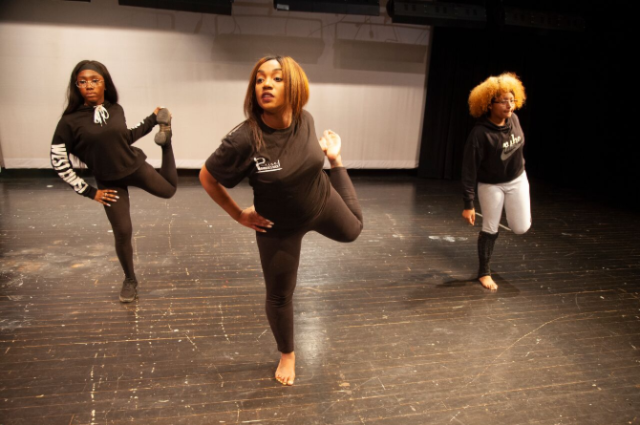
By Je’Don Holloway Talley
For the Birmingham Times
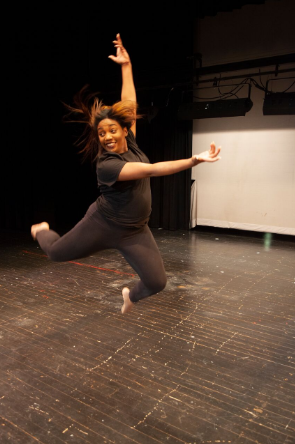
Rachel Simonne may be a part of the millennial generation, but her focus is on the next generation. As the director of A.H. Parker High School’s Theater and Dance program, she is responsible for designing the department’s curriculum. She also teaches an array of theater, drama, and dance classes daily and directs three productions per year.
Simonne’s dance program is a safe space for students to express themselves and explore who they are as individuals.
“I feel like the up-and-coming generations face a lot of peer pressure, to the point where it stifles them individually,” she said. “I teach them how to be true and authentic, and how to not allow the opinions of others dictate their lives and decisions.”
Being in the millennial generation, Simonne, 27, sees her role as more than teacher and director.
“I am a mentor to some. I am a second mom to some. I’m a counselor to some,” she said. “I have to play so many roles because my students need so many things … they lack for whatever reasons.”
Like many millennials, Simonne is focused on the quality of education, particularly when it comes to teaching her students about African-American heritage and ancestry.
African-American Playwrights
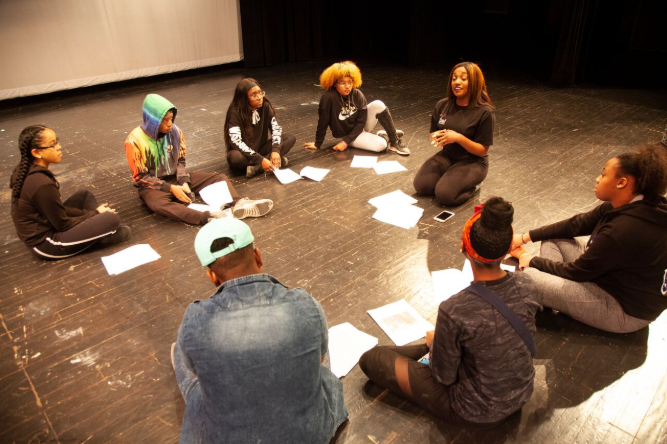
The Wylam native’s dance and theater curriculum are centered on black modern dance and the works of African-American playwrights, such as Lorraine Hansberry August Wilson, and Ntozake Shange.
“I’ve found that a lot of the other dance and theater genres are more so entertaining versus actually having a message [to which] we as African-Americans can relate,” said Simonne. “African-American playwrights make a connection between now and then, as it relates to our ancestry. It’s more meaningful.”
She believes African-American theater and dance pieces like “Black Nativity” by Langston Hughes, “The Seven Guitars” by August Wilson, and “Revelations” by the Alvin Ailey American Dance Theater have a greater impact on her students than classics like William Shakespeare’s “Romeo and Juliette” and Arthur Miller’s “Death of a Salesman.”
Also, “a lot of traditional musicals and dance programs are ballet heavy,” Simonne added. “I incorporate different African-based genres and plays that have been created by African-American playwrights into the program. It’s bigger than just theater and dance—for me and for them.”
Part of Simonne’s goal is to create “woke” individuals.
“‘Woke’ is a state in which you know you don’t know everything. It’s a state of vulnerability. It’s a state of being able to receive and analyze and understand the world that’s going on around you and outside of you, so that you’re able to make the best-informed decisions about your life,” she said.
Simonne reaches young people via several platforms. In addition to directing the Parker High Theater and Dance program, she is coach and coordinator of the school’s marching band dance line. Also, at More Than Conquerors Faith Church she is responsible for creating liturgical dance pieces for the praise and dance team to perform on designated youth Sundays.
Valuable Life Lessons
Simonne said her single mom taught her valuable life lessons about choosing a career and academic path.
“Growing up … with three older siblings, I saw the fight for resources …, so I wanted to go after financial security versus following my [dance and theater] passion,” she said.
Simonne invested heavily into her own education, earning a Bachelor of Arts degree in psychology from Samford University and a Master of Science degree in higher education from Capella University, an online school. Her dance and theater education continue to this day by way of attending conferences, festivals, and intensive training courses.
“I continue to train and spend thousands of dollars traveling for training,” she said.
Although her mother couldn’t afford dance classes at a studio, Simonne still learned from skilled instructors.
“I am one of the former captains of a local majorette team at [the North Birmingham Rec Center] that was under the direction of Debra Blackmon, [who has taught dance in Birmingham for more than 20 years],” Simonne said. “I was [also] part of her troop while I [attended] Bush Middle School in Ensley.”
At P.D. Jackson Olin High School, Simonne studied in theater and dance program under Yolaine Joseph, who still teaches with Birmingham City Schools. She trained under Ursula Smith of the Dance N2 Destiny studio and was part of the Jefferson County Committee for Economic Opportunity (JCCEO) Ambassadors Troop, an inspirational group that has performed at local venues, such as the Alabama Theatre and Carver Theatre. She also trained with instructors in Tampa, Fla., St. Louis, Mo., Dallas, Texas, and Atlanta, Ga.
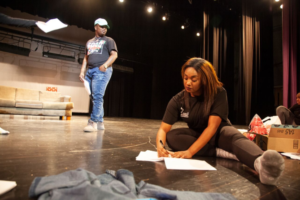
“I’ve kind of trained all over because the type of dance [genre] I’m interested in, which is African American influenced, is not really prominent here in Alabama,” she said. “I’ve had to travel to get to it.”
For Black History Month, Simonne is in the process of directing and choreographing a piece entitled “The Unsung,” a visual representation and exploration of the voices of those who have passed away and didn’t have a chance to tell their stories.
“Two of the stories we’re exploring are the story of Sandra Bland, [a 28-year-old African-American woman who was found hanged in a jail cell in Waller County, Texas, in 2015], and the Charleston shooting, [during which 21-year-old white supremacist Dylann Roof murdered nine African-Americans during a prayer service at the Emanuel African Methodist Episcopal Church in downtown Charleston, S.C., in 2015].”
Meet the millennials on the move in the Magic City
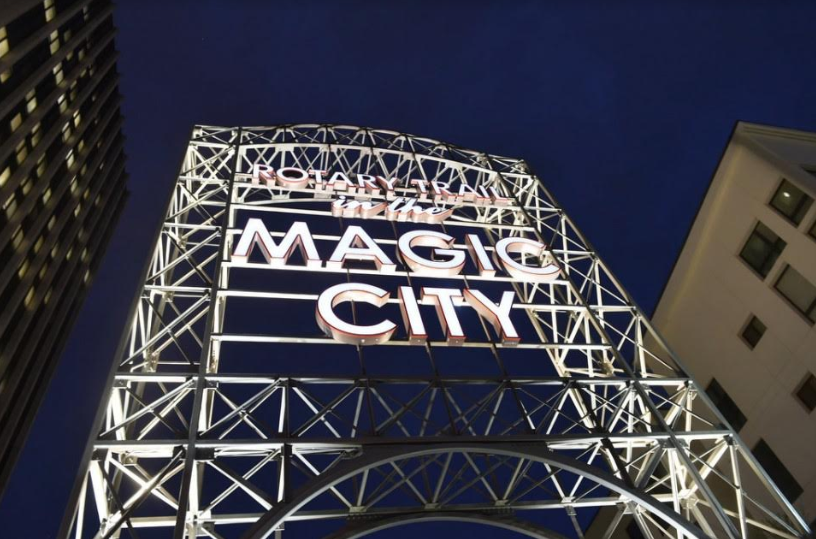
By Je’Don Holloway Talley
For the Birmingham Times

For Ace Graham, Birmingham is the perfect metropolis for millennials to launch their dreams.
Graham, 34, owns and operates Alchemy, a high-end streetwear “creative boutique” in the Southside’s Five Points district, near the corner of 11th Avenue South.
“If there is something [millennials] want to do, they can do it here: a brewery, a streetwear shop. … There are a lot of opportunities here because it’s not oversaturated,” he said.
Graham’s vibrant, artsy space is ideal for millennials, many of whom are often found socializing there: “We try to provide that here,” he said. “I don’t have many places to hang out. … For the most part, if we want to go somewhere else or hang out, we go to the Magnolia House.”
The Magnolia House is owned by Justin Streeter, who also uses his two-story establishment on Magnolia Avenue, on Birmingham’s Southside, to encourage creativity and host events.
“The guys over there are very good friends of ours, and we try to support each other as much as possible,” Graham said. “Streeter is a very good friend of mine. [He] comes in often, and we share conversation.”
Meet the Millennials
According to the Pew Research Center, the Millennial generation—anyone born between 1981 and 1996 (ages 23 to 38 in 2019)—is “the first generation to come of age in the new millennium.” Compared with adults in previous generations, they “are the most racially and ethnically diverse adult generation in the nation’s history” according to a recent article, “Defining Generations: Where Millennials End and Generation Z Begins.”
In fact, the Birmingham-Hoover metropolitan statistical area has about 248,000 millennials, who now make up the largest part of the area’s workforce, according to data from the Birmingham Business Alliance (BBA).
Last year, Birmingham Mayor Randall Woodfin—himself a millennial, at 37—told Alabama State University (ASU) students during a lecture series, “There are an estimated 69 million millennials across this nation. When we are woke and engaged, there is nothing we can’t do.”
That’s certainly true of Graham at Alchemy and Streeter at Magnolia House. The two business owners share a great chemistry and sense of comradery.
“We’re definitely about sharing information for the betterment of both of us,” Graham said. “If we have someone in town like [AKOO clothing’s] Jason Geter, [who co-founded the fashion brand with rapper Clifford ‘T.I.’ Harris], once that event is over, we’ll fall over into [Streeter’s] place and spread the love. … That helps out a whole lot.”
Wide Open

Streeter, a 29-year-old Ensley native, has a venue that caters to college students and millennial professionals looking for different experiences: “Professionals like the lounge-type vibe, and college students like the club, high-energy vibe,” he said.
Magnolia can also serve as a vending space for independent retailers.
“We’ve had pop-up shops for I don’t know how many clothing lines here in Birmingham. [We’ve had] cooking events. It’s just open,” Streeter said. “We have our nightlife, but I strategically fit those [other] types of events into our lineup. Whether it’s before the nightlife begins or whatever we’ve got to do, we’re going to make it work.”
The Ramsay High School grad said this is a good time for millennials in Birmingham, which is wide open.
“Being in Birmingham right now, you have an opportunity to create your own way versus jumping on somebody else’s wave,” Streeter said. “You can find you a nice commercial business space and just start dreaming.”
More Than a Teacher
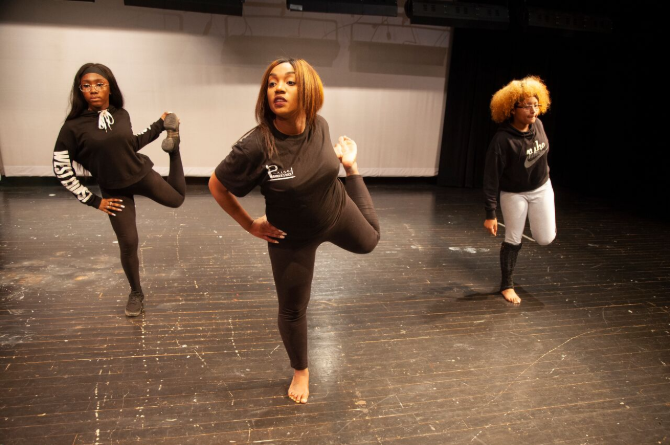
Speaking of dreams, that’s what Rachel Simonne, director of A.H. Parker High School’s Theater and Dance program, helps her students realize. Simonne, who is responsible for designing the department’s curriculum, teaches an array of theater, drama, and dance classes daily and directs three productions per year.
Being in the millennial generation, Simonne, 27, sees her role as more than teacher and director.
“I am a mentor to some. I am a second mom to some. I’m a counselor to some,” she said. “I have to play so many roles because my students need so many things … they lack for whatever reasons.”
The Wylam native’s dance and theater curriculum are centered on black modern dance and the works of African-American playwrights, such as Lorraine Hansberry August Wilson, and Ntozake Shange.
“I’ve found that a lot of the other dance and theater genres are more so entertaining versus actually having a message [to which] we as African-Americans can relate,” said Simonne. “African-American playwrights make a connection between now and then, as it relates to our ancestry. It’s more meaningful.”
Messaging
Birmingham City Council Creative Director Desmond “Dez”

branding concepts and music videos. (Provided Photo)
Wilson, 31, knows the importance of messaging. That’s his specialty both in and away from City Hall.
When working for the city of Birmingham, Wilson and his team manage all visual communications pertaining to City Council branding, broadcast, social media, and press. The group also seeks new ways to bridge modern communications and municipal government to help promote transparency and efficiency.
“We’re always searching for ways to educate the public on government resources, practices, and processes: how to apply for a license, how to get a business license,” Wilson said. “These are the types of things the public needs to be educated on.”
Away from City Hall, Wilson uses his talents to give back to the community “by telling black stories [and] exposing black talent to different avenues.”
“We’ve been so far removed from controlling our own messaging and controlling [how we are perceived],” he said. “It’s becoming increasingly important that I continue to [remain] a part of my community and work to cultivate and grow our understanding.”
Like others, Wilson sees Birmingham as a city where millennials can thrive.
“Birmingham is a growing attraction [because] of the industries and companies that are coming here and the general amenities [the city] is beginning to offer for millennials,” he said, noting new entertainment and event venues in the area, including TopGolf in downtown Birmingham and Dave and Buster’s in Hoover, that are very appealing to the millennial generation.




